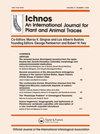New ichnospecies and redescription of Caedichnus Stafford et al., 2015, traces indicative of durophagous predation
IF 2
4区 地球科学
Q4 PALEONTOLOGY
Ichnos-An International Journal for Plant and Animal Traces
Pub Date : 2023-01-02
DOI:10.1080/10420940.2023.2219824
引用次数: 0
Abstract
Abstract Predation traces on marine shelled prey are informative and widely utilized indicators of predatory attacks in the scientific literature. Most of these traces remain undescribed and unnamed, making it difficult to identify and quantify predatory behaviour in the fossil record. Two new ichnospecies, Caedichnus cisus and Caedichnus lunaris, have been described and erected into the emended ichnogenus Caedichnus, assigned to the ichnofamily Belichnidae (Wisshak et al., 2019), and a previously proposed synonymy of Caedichnus with Bicrescomanducator is rejected. Both new ichnospecies are indicative of an attack from a durophagous predator and are often associated with repair scars, indicating the attack was unsuccessful, allowing the prey to repair its shell to some degree. The morphology of the prey shell and the method of predator attack are likely to influence both the shape of the resulting trace and whether one results in subsequent repair. Describing predation traces will create consistency between researchers and facilitate the comparison of predation types, predators, and shell morphologies.新鱼种及Caedichnus Stafford等人的重新描述,2015,指示硬食性捕食的痕迹
在科学文献中,海洋有壳猎物的捕食痕迹是一种信息丰富且被广泛应用的掠食性攻击指标。大多数这些痕迹仍然没有被描述和命名,这使得在化石记录中识别和量化掠食性行为变得困难。两个新的鱼种,Caedichnus cisus和Caedichnus lunaris已被描述并建立到经修订的Caedichnus属中,并被分配到鱼科Belichnidae (Wisshak et al., 2019),并且先前提出的Caedichnus与bicrescomducator的同属被拒绝。这两种新的鱼类都预示着受到了硬食性捕食者的攻击,并且通常与修复疤痕有关,这表明攻击失败了,这使得猎物在某种程度上修复了它的外壳。猎物外壳的形态和捕食者攻击的方法可能会影响所产生的痕迹的形状,以及是否会导致随后的修复。描述捕食痕迹将在研究人员之间建立一致性,并促进对捕食类型、捕食者和壳形态的比较。
本文章由计算机程序翻译,如有差异,请以英文原文为准。
求助全文
约1分钟内获得全文
求助全文
来源期刊
CiteScore
2.50
自引率
12.50%
发文量
0
审稿时长
>12 weeks
期刊介绍:
The foremost aim of Ichnos is to promote excellence in ichnologic research. Primary emphases center upon the ethologic and ecologic significance of tracemaking organisms; organism-substrate interrelationships; and the role of biogenic processes in environmental reconstruction, sediment dynamics, sequence or event stratigraphy, biogeochemistry, and sedimentary diagenesis. Each contribution rests upon a firm taxonomic foundation, although papers dealing solely with systematics and nomenclature may have less priority than those dealing with conceptual and interpretive aspects of ichnology. Contributions from biologists and geologists are equally welcome.
The format for Ichnos is designed to accommodate several types of manuscripts, including Research Articles (comprehensive articles dealing with original, fundamental research in ichnology), and Short Communications (short, succinct papers treating certain aspects of the history of ichnology, book reviews, news and notes, or invited comments dealing with current or contentious issues). The large page size and two-column format lend flexibility to the design of tables and illustrations. Thorough but timely reviews and rapid publication of manuscripts are integral parts of the process.

 求助内容:
求助内容: 应助结果提醒方式:
应助结果提醒方式:


